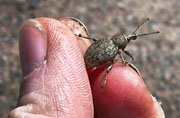
The Northern New York Agricultural Development Program, Cornell Cooperative Extension, and the Shields Lab at Cornell University are partnering to offer farmers a cost-sharing opportunity to encourage more growers to treat fields with biocontrol nematodes in areas infected with the highly destructive alfalfa snout beetle. The deadline for expressing interest in the funding is May 15, 2015.
Alfalfa snout beetle is the major limiting factor in alfalfa production and stand longevity in all six NNY counties: Clinton, Essex, Franklin, Jefferson, Lewis and St. Lawrence. The pest is also known to exist in three other counties in New York State and in southeastern Ontario.
‘Uncontrolled, the beetle can destroy a new alfalfa seeding in just a year or two, with field losses from $250 to $400 per acre,’ says Cornell Cooperative Extension Field Crops and Soils Specialist Kitty A. O’Neil.
To date, the beetle-attacking nematodes have been applied to between 8,000 and 10,000 acres of NNY farmland. A single application is enough to prompt success.
‘Early adopting producers who have applied the nematodes to multiple fields within an area have reported a significant decline in the alfalfa snout beetle population on their farm and are now successfully growing alfalfa again,’ says Cornell Cooperative Extension Field Crops Specialist Michael E. Hunter.
The farmer-driven Northern New York Agricultural Development Program is making funding available to help underwrite the rearing and application of the native nematodes. Extension personnel are serving as the application conduit.
‘On-farm research in Northern New York in the past seven years indicates that just a single application of the biocontrol nematodes is required in a field as the nematodes will persist in the field for many years,’ says Cornell Entomologist Elson Shields.
Click here for more information and application details